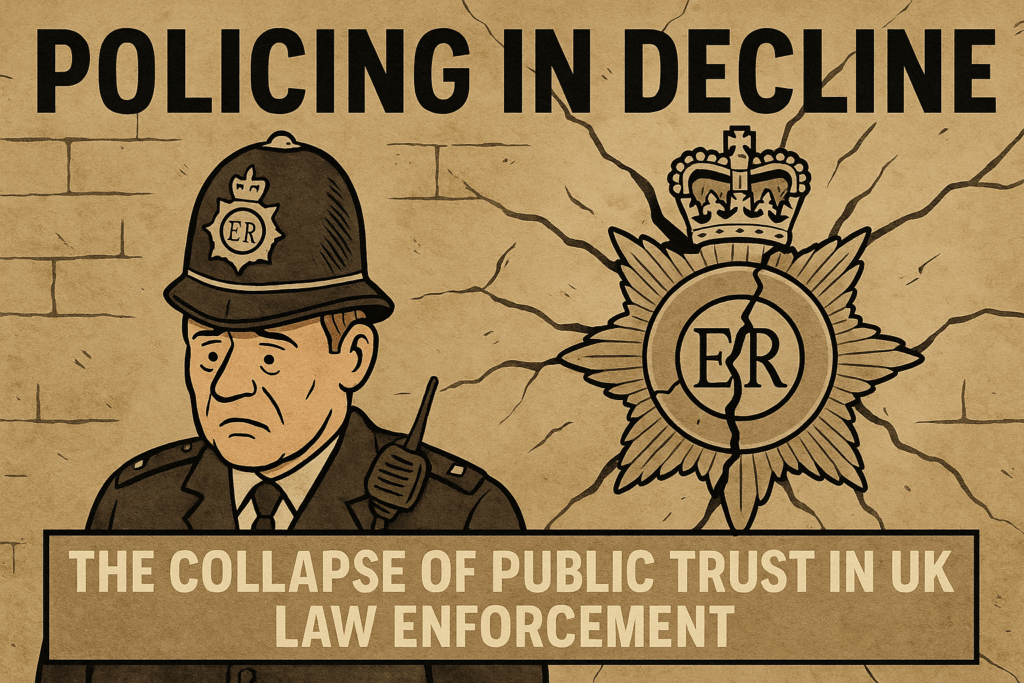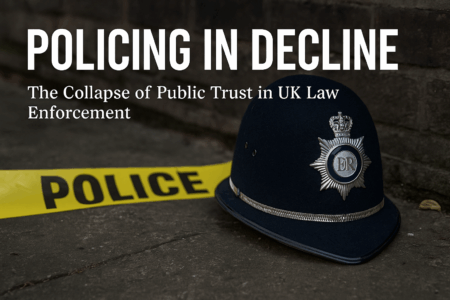🛡️The British Police Have Turned From Solving Crimes to Ideology
Once regarded as one of the world’s most respected institutions, British policing is now mired in scandal, softness, and public disillusionment. From turning a blind eye to organised grooming gangs, to arresting citizens for mean tweets while actual crime skyrockets — the priorities of UK law enforcement appear to have shifted from justice to ideology.
Broken Priorities
Knife crime continues to devastate inner-city communities, burglary clearance rates are pitiful, and police morale is at an all-time low. Yet, forces across the country seem to have ample resources for rainbow patrol cars, pronoun training, and patrolling online speech. When police show up at someone’s door over a “non-crime hate incident” tweet — but not for an actual burglary — trust breaks down.
Political Policing
The public increasingly sees policing not as impartial, but political. Arrests at anti-immigration protests happen faster than those at grooming gang trials. Officers are quick to kneel for certain causes while ignoring the concerns of working-class communities long dismissed as “far-right” for speaking up.
Consequences of Cowardice

The collapse in confidence isn’t just unfortunate — it’s dangerous. A country where the law is selectively applied is not a free country. When grooming gang crimes were covered up to avoid “offending communities,” it wasn’t just a moral failure — it was institutional cowardice at scale.
What Needs to Change
Policing must return to basics: catching criminals, protecting the vulnerable, and acting impartially. Political neutrality, community-rooted officers, and actual crime-fighting — not social media PR — should define the future of British policing.
If not, the gap between the governed and the enforcers will only grow wider — and public trust may never recover.
🌍 Britain’s Border Crisis: How Mass Migration Is Changing the Nation
Britain is in the grip of a migration crisis — one that’s overwhelming public services, reshaping neighbourhoods, and silencing ordinary people through political correctness and fear of accusation.
A Broken Border
Illegal boat crossings have surged, with tens of thousands arriving across the English Channel. The government talks tough but delivers little. Deterrence has failed, and deportations are rare. Once here, claimants vanish into the system or are housed — sometimes in hotels at taxpayers’ expense — while British veterans sleep on the streets.
Impact on Communities
Hospitals are stretched to capacity, housing lists grow longer, and schools struggle to adapt to sudden demographic shifts. Local people are told to “just accept it.” Yet when they voice concerns, they’re branded as bigots by the very politicians they elected to represent them.
Cultural Strain
Integration is not occurring at the scale needed. Parallel societies emerge, and British values are increasingly marginalised. Yet, media outlets prefer to focus on feelings over facts, and leaders refuse to confront the issue honestly for fear of backlash from activist groups.
The Way Forward
Britain must reclaim control over its borders — not just in theory, but in practice. That means ending the open-door asylum scam, prioritising skilled immigration, and putting British citizens — and British values — first. Without urgent reform, we risk losing not just control, but the very character of the country itself.

⚖️ The Starmer Slide: Broken Promises and Bureaucratic Stagnation
Since taking office in July, Sir Keir Starmer’s government has moved with all the urgency of a Whitehall filing cabinet. The big promises — reform, justice, competence — have already begun to crumble under the weight of political cowardice, ideological drift, and sheer lack of action.
No Real Reform
Despite inheriting a country gripped by crisis — cost of living, housing shortages, immigration, energy — Starmer’s Labour has offered more bureaucracy than boldness. His pledge to “make Brexit work” now looks like an empty slogan as EU alignment policies begin to creep back in. Instead of national renewal, Britain gets more red tape.
Soft on Crime, Blind on Migration
While violent crime continues to plague major cities, Starmer’s government has done little to empower police or address soft sentencing. His Home Office appears paralysed on illegal immigration, and the boats haven’t stopped — they’ve increased. Yet ministers seem more concerned with hate speech policies than with border security.
Woke Over Working Class
For all his PR-crafted image of reasonableness, Starmer leads a party more obsessed with identity politics than improving lives. Parents worry about school indoctrination; Labour worries about pronouns. When pushed on grooming gangs, Starmer deflects — despite being DPP when prosecution failures happened under his watch.
The Verdict
Six months in, and the direction is clear: slow, centralised, ideologically filtered governance that serves the civil service machine — not the people. Voters expected grown-ups back in charge. What they got was more of the same elite evasion — only now wearing a red tie.
Reform is not optional — it’s overdue. And Starmer has already proven he won’t deliver it.
⚠️ Grooming Gangs and the Failure of the British Establishment
For decades, the industrial-scale abuse of vulnerable girls across UK towns was allowed to continue — not just by the perpetrators, but by the very authorities meant to stop them. Rotherham, Telford, Rochdale, Oxford — the list goes on. Each scandal reads the same: police knew, councils knew, social workers knew. But few acted. Why?
A Culture of Cowardice
The fear of being labelled racist overrode the duty to protect children. Time and again, whistleblowers were silenced, evidence ignored, and victims abandoned. When officers and councillors feared for their careers more than the safety of the public, abuse flourished in the shadows.
Institutional Blindness
These weren’t isolated incidents — they were systemic. Patterns of abuse repeated across cities and boroughs, often in Labour-run councils. Yet prosecutions lagged, and media coverage was muted. Even as survivors spoke out, the national conversation was carefully controlled.
Starmer’s Role
When Keir Starmer was Director of Public Prosecutions, multiple cases were dismissed or deprioritised. His department failed to pursue abusers despite credible testimony. The same DPP office that wouldn’t charge Jimmy Savile also looked away from grooming gangs.
National Reckoning Needed
This isn’t just a past shame — it continues. Reports still emerge of ongoing exploitation, ignored complaints, and cultural silence. A true reckoning is overdue: one where justice trumps politics, where child safety comes before political correctness, and where those who covered it up are held to account.
Without it, justice remains undone — and trust can never be restored.
Related:
Met police fail in almost all work areas
British Police Has Lost it’s Way in Target Culture

